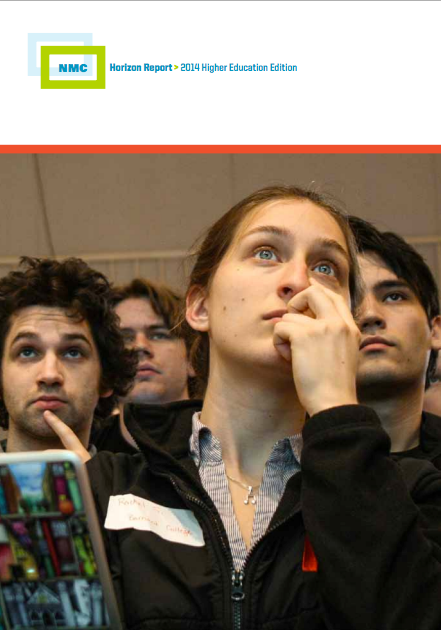Now Available: NMC and EDUCAUSE Release Horizon Report: 2014 Higher Ed. Edition
The Horizon Report: 2014 Higher Ed. Edition is now available online.
From a NMC Summary:
This eleventh edition describes annual findings from the NMC Horizon Project, an ongoing research project designed to identify and describe emerging technologies likely to have an impact on learning, teaching, and creative inquiry in education. Six key trends, six significant challenges, and six emerging technologies are identified across three adoption horizons over the next one to five years, giving campus leaders and practitioners a valuable guide for strategic technology planning.
The format of the report is new this year, providing these leaders with more in-depth insight into how the trends and challenges are accelerating and impeding the adoption of educational technology, along with their implications for policy, leadership and practice.
Topics/Trends Discussed in the 2014 Report
Key Trends Accelerating Higher Education Technology Adoption
This year’s NMC Horizon Report identifies the Integration of Online, Hybrid, and Collaborative Learning and the Growing Ubiquity of Social Media as fast trends driving changes in higher education over the next one to two years.
The Shift from Students as Consumers to Students as Creators and the Rise of Data-Driven Learning and Assessment are mid-range trends expected to accelerate technology use in the next three to five years; and Agile Approaches to Change and the Evolution of Online Learning are long-range trends, positioned at more than five years away.
Significant Challenges Impeding Higher Education Technology Adoption
A number of challenges are acknowledged for presenting barriers to the mainstream use of technology in higher education. Low Digital Fluency of Faculty and Relative Lack of Rewards for Teaching are perceived as solvable challenges – those which we both understand and know how to solve. Competition from New Models of Education and Scaling Teaching Innovations are considered difficult challenges, which are defined as well understood but with solutions that are elusive. Described as wicked challenges are Expanding Access and Keeping Education Relevant, which are complex to define, much less address.Important Developments in Educational Technology for Higher Ed
Additionally, the report identifies Flipped Classroom and Learning Analytics as technologies expected to enter mainstream use in the first horizon of one year or less. 3D Printing and Games and Gamification are seen in the second horizon of two to three years; Quantified Self and Virtual Assistants are seen emerging in the third horizon of four to five years.
How the Report is Developed & Expert Panel
Every report draws on the considerable expertise of an international expert panel that first considers a broad set of important trends, challenges, and emerging technologies, and then examines each of them in progressively more detail, reducing the set until the final listing of trends, challenges, and technologies is selected. This process takes place online, where it is captured in the NMC Horizon Project wiki. The wiki is intended to be a ompletely transparent window into the work of the project, one that not only provides a real-time view of the work as it happens, but also contains the entire record of the research for each of the various editions published since 2006. The wiki used for the NMC Horizon Report: 2014 Higher Education Edition can be found at horizon.wiki.nmc.org.
The panel was composed of 53 technology experts from 13 countries on six continents this year; their names and affiliations are listed at the end of this report. Despite their diversity of backgrounds and experience, they share a consensus view that each of the profiled technologies is going to have a significant impact on the practice of higher education around the globe over the next five years. The key trends driving interest in their adoption, and the significant challenges higher education institutions will need to address if they are to reach their potential, also represent their perspective.
Direct to Full Text Report (52 pages; PDF)
Released with CC BY License
Summary Video
Click Cover Image to Access Full Text Report
Filed under: Data Files, Management and Leadership, News, Reports
About Gary Price
Gary Price (gprice@gmail.com) is a librarian, writer, consultant, and frequent conference speaker based in the Washington D.C. metro area. He earned his MLIS degree from Wayne State University in Detroit. Price has won several awards including the SLA Innovations in Technology Award and Alumnus of the Year from the Wayne St. University Library and Information Science Program. From 2006-2009 he was Director of Online Information Services at Ask.com.



